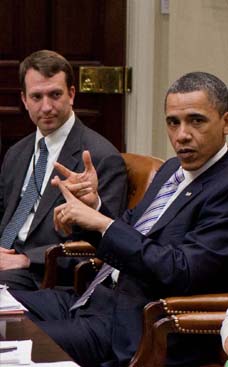
Fifty years on, what has the Peace Corps accomplished? It's possible to cite the pounds of fish sold or the pounds of honey produced under volunteer projects. But how do you measure the influence of an inspiring teacher? Or the effect on an impoverished teenage boy such as Alejandro Toledo, who, with volunteers' help, goes on to college and becomes the president of Peru? But there is no difficulty measuring the impact of the Peace Corps on the United States. Half a century after Kennedy's call, the Peace Corps' greatest achievement may be the volunteers themselves. Peace Corps alumni include two U.S. senators - Chris Dodd of Connecticut and the late Paul Tsongas of Massachusetts - and nine members of the House of Representatives, as well as governors of Wisconsin and Ohio and the mayor of Pittsburgh. One Cabinet member was a volunteer: Donna Shalala, Health and Human Services secretary in the Clinton administration and now the president of the University of Miami. Ten other volunteers are presidents of universities and colleges. More than 20 have served as ambassadors or assistant secretaries of State; others went on to become teachers, doctors, economic development specialists. The novelist Paul Theroux heads a long list of Peace Corps writers, and the roster of journalists includes Chris Matthews of MSNBC and George Packer and Peter Hessler of the New Yorker. The founders of Netflix and the Nature Co., and the board chairs of Levi Strauss and the Chicago Bears, were also volunteers. In all, some 200,000 Americans have lived, often in the remotest of villages, in countries in Africa, Asia, Latin America, the Pacific and Eastern Europe - places most other Americans can't find on a map. We would not have this enormous asset today without the Peace Corps. That is surely worth a birthday celebration.
Stanley Meisler writes: The corps' celebrity and size may have diminished, but its longevity is a testament to its importance
True to the Peace Corps
Op-Ed
The corps' celebrity and size may have diminished, but its longevity is a testament to its importance.
February 25, 2011|By Stanley Meisler
In some ways, the Peace Corps, which celebrates its 50th anniversary Tuesday, is a shadow of what it once was.
It had so much pizzazz in the early days that newspapers proclaimed the names of new volunteers as if they had just won Guggenheim fellowships. Now, the number of volunteers - 8,655 - is about half of what it was at its highest in 1966, and not everyone knows the Peace Corps still exists.
The first director - the irrepressible, inspiring Sargent Shriver, who put the program together in six months - made the cover of Time in 1963. The current director - Aaron Williams, a former volunteer with decades of experience in international development - barely gets his name in the papers. At a panel discussion at George Washington University a couple of years ago, Christiane Amanpour, then chief foreign correspondent of CNN, listed factors that had contributed to American worldwide popularity in the past. "There was a Peace Corps," she said.
Yet the Peace Corps, despite its loss of celebrity and size, has improved a great deal during its 50 years. It probably does a better job at one of its main goals: providing skilled manpower to poor countries in need. The volunteers are better trained than in the early years, arriving at their posts speaking not only the official language of the host countries but the local tribal language as well.
Moreover, the volunteers are better deployed. In the early days, a few towns had scores of Peace Corps volunteers - a single school in Ethiopia, for example, might have had a dozen volunteer teachers. Now, many volunteers are assigned to villages by themselves.
The Peace Corps' longevity is a testament to a good idea, and the corps is surely President Kennedy's most enduring legacy. But its progress has never been guaranteed.
In 1965, for example, President Lyndon Johnson dispatched more than 20,000 troops to quash an insurrection against the right-wing military government in the Dominican Republic. Many of the 108 Peace Corps volunteers there were shocked, especially the 34 nurses and community development workers assigned to the poor barrios of the capital, Santo Domingo. If the U.S. intervened on any side, they reasoned, it should be on the side of the rebels, who were trying to restore a democratically elected president who had been overthrown in a military coup.
But Johnson, poorly advised by panicky American diplomats, believed the rebels were communists who intended to set up another Castro-like government in the Caribbean.
The volunteers told American reporters that they and their Dominican neighbors deplored Johnson's escapade. An infuriated president complained that the Peace Corps volunteers "were the first ones to jump us."
Johnson wanted to pull the volunteers out. But he realized that would call even more attention to their opposition. So the White House rushed Peace Corps officials from Washington to Santo Domingo to quiet the volunteers. The officials succeeded by warning that the future of the agency was at stake.
Then the drama shifted. The White House decided the Peace Corps could be an asset and an antidote to the American invaders. Dominicans were angry at American soldiers, but the volunteers were still popular; they were admired as "the children of Kennedy." White House officials busied themselves trying to increase the size of the Peace Corps in the Dominican Republic. There was talk of assigning more than 1,000 volunteers to the Dominican Republic - whether it needed them or not. The whole project finally collapsed of its own stupidity.
It wasn't the last time politics threatened the corps. President Nixon tried to destroy it outright, mostly out of his deep antipathy toward a successfully fulfilled Kennedy campaign promise, but he only managed to bury it as part of another agency for 10 years.
Then the Vietnam War crippled recruitment as many young Americans dismissed the Peace Corps as no more than the smile on the face of the American tiger. President Reagan dragged the Peace Corps into his foreign policy by using it to reward Honduras for harboring the right-wing Contras fighting the left-wing Sandinistas in Nicaragua.
In more recent years, the corps has grappled with different controversies. After the Cold War ended, an ambitious Peace Corps director, Paul Coverdell, distorted its mission, rushing hundreds of volunteers into Eastern Europe to teach capitalism and the language of capitalism, English. Some of the countries were so poor that there is no doubt they could have used volunteers, but it was hard to fathom what the Peace Corps was doing in great European cities such as Prague and Budapest.
More recently, the corps has been publicly criticized for supposedly failing to protect female volunteers - 60% of those serving overseas - from sexual assaults and harassment. Based on Columbia University and Peace Corps statistics, the incidence of rape on college campuses is higher than in the corps. However, one rape victim came forward to accuse the corps of treating her as if she were at fault. Moreover, cultural attitudes make it difficult for female volunteers in some countries to avoid sexual harassment.
Fifty years on, what has the Peace Corps accomplished? It's possible to cite the pounds of fish sold or the pounds of honey produced under volunteer projects. But how do you measure the influence of an inspiring teacher? Or the effect on an impoverished teenage boy such as Alejandro Toledo, who, with volunteers' help, goes on to college and becomes the president of Peru?
But there is no difficulty measuring the impact of the Peace Corps on the United States. Half a century after Kennedy's call, the Peace Corps' greatest achievement may be the volunteers themselves.
Peace Corps alumni include two U.S. senators - Chris Dodd of Connecticut and the late Paul Tsongas of Massachusetts - and nine members of the House of Representatives, as well as governors of Wisconsin and Ohio and the mayor of Pittsburgh. One Cabinet member was a volunteer: Donna Shalala, Health and Human Services secretary in the Clinton administration and now the president of the University of Miami. Ten other volunteers are presidents of universities and colleges.
More than 20 have served as ambassadors or assistant secretaries of State; others went on to become teachers, doctors, economic development specialists. The novelist Paul Theroux heads a long list of Peace Corps writers, and the roster of journalists includes Chris Matthews of MSNBC and George Packer and Peter Hessler of the New Yorker. The founders of Netflix and the Nature Co., and the board chairs of Levi Strauss and the Chicago Bears, were also volunteers.
In all, some 200,000 Americans have lived, often in the remotest of villages, in countries in Africa, Asia, Latin America, the Pacific and Eastern Europe - places most other Americans can't find on a map. We would not have this enormous asset today without the Peace Corps. That is surely worth a birthday celebration.
Stanley Meisler, a former Times staff writer, was deputy director of the Peace Corps office of evaluation and research. His latest book is "When the World Calls: The Inside Story of the Peace Corps and Its First Fifty Years."















